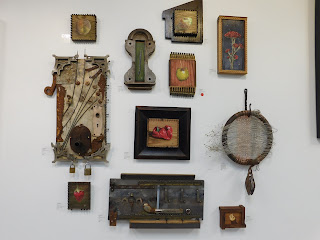Combobulated Abstractitudes and Bruised Fruit
Moonlight Mile, by Joe Ostrowske Calm Like a Bomb, by Joe Ostrowske Through the Eyes of Ruby, by Joe Ostrowske Can't You Hear Me Knocking, by Joe Ostrowske by Jo Westfall by Jo Westfall Blow In It, by Jo Westfall The Queen's Astronomer, by Jo Westfall
By Tom Wachunas
“Forget your
ideas about art. Make a shopping list of everything you like about what you've
done. Include qualities that you've seen in your life, in the world, and
possibly in art that you like. Take this list and make a work that satisfies
all of the things on your list without caring if it looks like art.” — Joseph Kosuth
“Art is an experience, not an object.” - Robert Motherwell
EXHIBIT: Joe and Jo – works by Joe Ostrowske and Jo
Westfall / at Cyrus Art Gallery, 2645 Cleveland Avenue NW, Canton, Ohio / Meet
the artists at “A Second Look”
party on January 20 at 6:30 p.m.– exhibit ends on JANUARY 30, 2023
/ 330.452.9787 / Gallery Hours are Mon.-Fri. 10 a.m. to 6 p.m., Sat. 11 a.m. to
3 p.m.
This provocative,
intriguing and otherwise spectacular exhibit of paintings and assemblages has
left me transfixed for weeks after first seeing it.
Joe Ostrowske has
said of his highly expressionistic acrylic canvases that he is addressing “…the
way that we all maneuver through the overlapping obstacles of life to find our
way.” Finding our way indeed.
So what’s the destination? What specifically
is being symbolized? That’s an open-ended proposition to be sure. If all else
fails, slap your imagination in the face. Hard. Wake it up. Look long, and listen.
Art expects nothing less. I’m willing to bet that if you ask 10 different
people what any one of these pictures means or does exactly, you’ll get at
least 20 different answers. Art can be like that.
I read these
paintings as a collective travelogue. They’re abstract extracts from a journey down
the rabbit hole of a volatile nexus – a rough-hewn crossroads, where
consciousness and subconsciousness (the artist’s and our own), along
with unrestrained intuition coexist. The paintings are suffused with a dizzying
diversity of stratified marks and scattered shapes amidst broad, amorphous
bursts and rhytms of sizzling bright colors. There’s a palpable sensation of quick
physical gestures, motion and transformation. An in-the-moment immediacy. Ostrowske’s
style is a painterly stenography of sorts - shorthand explanations of the very
actions and processes that brought the paintings into being. Smudge, scratch and scribble; drip, doodle and
delete; rub, rinse and repeat; expose, explore and erase; forget, flounder and find;
initiate, improvise and illuminate; wail softly, whisper loudly and wonder
always. Life can be like that.
Meanwhile,
versatile Jo Westfall has characterized her 2D and 3D works as “resource art.” Among
her many fascinating entries in this exhibit are small, “portraits” of bruised,
decaying fruit and vegetables, painted on grainy pieces of wood. In some ways
they evoke the ancient aesthetic trope of memento mori – images made as
warnings that life is short. Yet there’s nothing fearfully hideous about how
these natural resources are depicted in their states of imperfection. Westfall’s
exquisite technique imbues them not with the idea of death so much as a gentle
savoring of their beautiful fragility.
The caption accompanying the website (posted
above) photo of Westfall describes her as “Designer of adornments, Delver of
semi-conscious concepts, Explorer of seams.”
I would add, “Rescuer.” She’s a saver of found, castaway objects and
various tactile materials. For her 3D pieces, she skillfully joins together
seemingly unlikely candidates for the weaving process into elaborate
assemblages that are a fascinating twist on conventional “fiber art.”
Read the list of ingredients for The
Queen’s Astronomer: Repurposed fabrics and yarns, computer keyboard cables,
drum tuners, piano parts, chair springs, zip ties, and phone cable. Or for Blow
In It: Pneumatic hose, game controllers, phone cable, piano parts, coated
wire clothes hangers, and AV cables. Here’s the sinewy meshing of ordinary computer
guts, the common hardware innards of modern industry, or information and
communication technology. But now, the original functionality of those components
has morphed into a kind of metaphysical circuitry, transmitting a more purely
aesthetic experience beyond the mundane and prosaic.
So here’s to
the warp and weft of 3D poetry.













